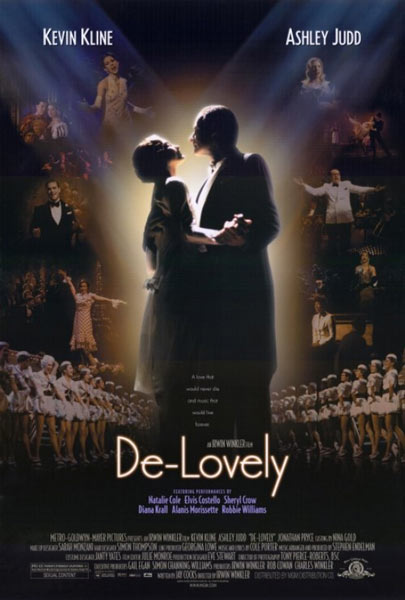De Lovely (2004)
Genre: Musical Biography | Age: 15-17
AGE RECOMMENDATIONS New Search
Ages 4 & Under – No
Ages 5 to 7 – No
Ages 8 to 9 – No
Ages 10 to 12 – No
Ages 13 to 15 – Probably Not
Ages 15 to 17 – With Guidance
MUSICAL BIOGRAPHY: (2004, PG-13.) (MGM Pictures) (2 hr, 5 min) WARNING: This review reveals plot surprises. The film follows the life of urbane, debonair, and self-absorbed songwriter Cole Porter from 1918 through 1964 told in flashbacks under the direction of a mysterious Gabe who seems to be putting on a stage show of Porter’s life for him to view. In 1918, at the time that Hemingway and the Fitzgeralds were in Paris, Cole meets Linda Thomas at a party and is instantly attracted. She, coming out of an abusive marriage, is charmed by the young man’s obvious talent and style. Realizing his bisexuality, she says she is willing to accept his lifestyle in their relation. They marry and she becomes both his manager and muse. Her only request is desecration about his sexual liaisons but this proves difficult. Irving Berlin becomes his sponsor and, through him, Cole gets a contract to write a Broadway show. After Linda’s miscarriage, they move to Hollywood. In a bad riding accident, Cole’s legs are severely injured. Linda suffers from a lung disease (while continuing to chain smoke) and ultimately dies. Cole ages and becomes a bitter recluse.
VIOLENCE/SCARINESS: Porter is thrown by a horse breaking a leg; the horse then rolls on him breaking the other leg. We see him in pain thorough dozens of operations and an ultimate amputation.
CRIMES: Blackmail (U).
MORALS, ISSUES & VALUES: The film explores the nature of Porter’s creativity and claims that his talent is related to his lifestyle of bisexuality, heavy drinking, and high living. The film demonstrates that the love between Cole and Linda did not depend on physicality since their sexual encounters were rare and unsatisfying, but rather was a love of caring, respect for talent, and supportive creativity. Hollywood, in the person of L. B. Meyer, demands that Porter dumb down his talent and write mediocre songs for the film industry. A man blackmails both Linda and Cole about Cole’s homosexuality. We are never sure whether this review of Porter’s life is an after-death experience, a visit to limbo, or a dream – after all his guide is named Gabe (Gabriel?). Diversity Issues: There are blacks in the background in various scenes. Linda accepts Cole’s bisexuality thought the world at large doesn’t. Language: A few profanities, some blunt sexual talk.
SEXUALITY, GENDER ISSUES & BODY FUNCTIONS: Nuclear family. Contemporary gender roles. Linda has just come out of an abusive marriage when she meets Cole. Porter is openly bisexual – we see him with several lovers, in bed with one and kissing another. Implied sex both hetero- and homo-sexual. We see men dancing together in a gay club.
SUBSTANCES: Porter drinks almost constantly. Everyone smokes. Linda is dying of a lung disease and continues to chain smoke. Considerable social drinking at parties, dinners, and at homes.
COMMENTS: A refreshing backward view into a long-lost musical world where romance and innocence dominated. The film explores Porter’s compositions in view of his sexual orientation (as compared to the ultra-straight “Day and Night” staring Cary Grant) and constantly points out tantalizing possibilities that the love songs were not all written with women in mind. In an obvious attempt to draw a young audience, the film features Porter tunes rendered (in various degrees of accomplishment) by modern singers such as Elvis Costello, Alanis Morissette, Natalie Cole, Sheryl Crow, Robbie Williams, Diana Krall, and several others (none of whom can approach the interpretations by, say, Ella Fitzgerald). The problem with this futile ploy is that the audience for these pop stars probably has no interest in Porter’s music – tuneful, clever, and lyrical. The degree of enjoyment of the film will depend on one’s familiarity and liking for Porter’s music – and that will leave most youngsters out. (Reviewed July 2004)
STARRING: Kevin Kline, Ashley Judd, Jonathan Pryce, Kevin McNally, Sandra Nelson, Allan Corduner, Peter Polycarpou, Keith Allen, Harry Ditson.
ALTERNATES: “All That Jazz” is another artist biography done from a surreal point of view. A musical that mixes filmmaking, stage, and “reality” is Antonio Saura’s “Tango.”
CONTENT REVIEW (1-5)
Nudity – 2Sexuality – 4
Physical Violence – 1
Emotional Stress – 3
Blood or Gore – 1
Language/Profanity – 1
Immorality – 4
Parental Guidance – 4
Watchability for Adults – 3
Artistic Merit – 2
Overall (For Kids of the Appropriate Age) – 3
